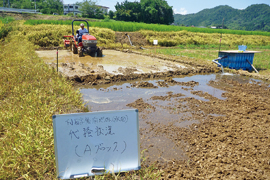The Mitsui & Co. Environment Fund
Introduction to Grant Projects
Renewable Energy Promotion Association
Decontamination of paddy fields in the Shimooguni district of Fukushima Prefecture
Activity grant
- Project Description
The radioactive decontamination of paddy fields is desired to maintain the fertile state of rice paddies that will be passed on from one generation to the next. Prefectural and municipal governments are giving advice on contamination through the ploughing in of rice straw and the spreading of zeolite onto the fields; however, there are problems such the accumulation of pollutants and the ruining of the paddy fields, so the problem is stagnating. This project is carried out in collaboration with the Shimooguni District Council of Fukushima Prefecture that has has until now been working on this problem independently. The project involves the use of bamboo charcoal and other absorbent materials during the puddling of the paddy fields, to reduce the levels of radioactive cesium in the paddy field soil by making the removal of the cesium more efficient, to enable rice cultivation to resume and to revitalize the local community.
- Fields
- Preservation of surface soil and forestsEnergy problemPreservation of biodiversity and ecosystem
- Grant year
- FY2012 Activity Grants
- Grant term
- 2 years and 6 months
April 2012 - September 2014
- Grant amount
- 3,519,000 yen
- Activity region
- Shimooguni aza, Ryouzen-machi, Date-shi, Fukushima Prefecture, Japan

Overview of the Organization

Shigeo Satou
- Representative
- Representative Director (Professor, Products Engineering & Environmental Management, Nippon Institute of Technology)
Shigeo Satou - Establishment
- 2005
- Establishment Purpose
- As a means to solve a number of current serious problems, such as worldwide industrialization, human population growth, a lack of energy resources due to improvements of living standards, the degradation of the global environment due to many years of fossil fuel use, as well as the need to conserve depleted fossil fuels for future generations, and to develop new energy sources, this association was established to spread and promote "renewable energy" in Japan that are non-fossil fuels, have zero emissions of greenhouse gases, and will contribute to raising Japan's level of energy self-sufficiency.
- Main regions of project activity
- Japan, Germany
- Staff
- 6 part-time members, 60 full members
- Annual operating budget
- 7.11 million yen in 2009, 3.07 million yen in 2010, 2.07 million yen in 2011
- WEB site
- http://repa-npo.com/
- Affiliated organizations
- Shimooguni District Council, Kirei na Ooguni o Torimodosu-kai, Houshanou to Seikatsu o Kangaeru-kai
- Main activities
- Spread the use in Japan of renewable energy sources, such as solar power, wind power, small-scale hydro power and biomass that can be used instead of fossil fuels and can help protect the global environment, and encourage international exchanges through renewable energy technologies. Through these activities, educate the public to help them understand the need for environmental protection and renewable energy technology, and help ordinary people to contribute to the creation of an affluent society that protects the environment. The promotion of energy regeneration is being carried out, using biomass as the fuel source, which is particularly abundant in Japan, which is fermented to produce methane.